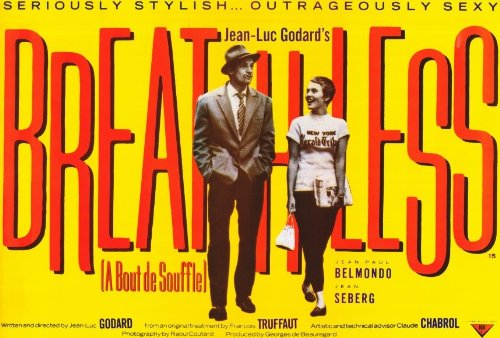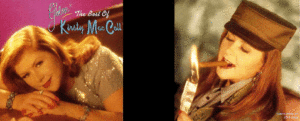Singer-songwriter Kirsty MacColl’s death brought a sudden, sad end to a brilliant career
(First published on time.com and used with the written permission of the author and publication of first instance.)
By Ed Grant
In the liner notes to the album Galore: The Best of Kirsty MacColl, ex-Pogues frontman Shane McGowan, posed the question that haunted MacColl’s fans for years: “Why isn’t she massively successful?” In the wake of her recent tragic death, this question takes on an added poignance, since McGowan, like many of her fellow musicians, was effusive in his praise of the “magic things” about MacColl’s personality, performances, and songwriting.
The answer to McGowan’s question could best be provided by music-industry analysts who would doubtless point out that singer-songwriters sell only to certain (read: older) audiences these days. They might also note that MacColl was a “hard sell” for record labels: a blunt talker who settled comfortably into a plus-size figure at various points, she eschewed the sexpot role required of female performers (playing the game for only a short while during her earliest “new wave” incarnation). She made only a handful of music videos – each of which emphasized the song, not the singer.
Kirsty MacColl was thus a bona-fide enigma: an immaculately talented artist who achieved a certain level of notoriety in her native England, but still couldn’t find a record label in the late 1990s. Here in the United States, her sole claim to fame was having written Tracey Ullman’s hit “They Don’t Know.”
All this would be lamentable but unremarkable — given that a number of other talented musicians are uniformly ignored by both the music industry and press in this country — were it not for MacColl’s untimely, and horribly tragic, death on December 18th of last year. MacColl, 41, was on a Mexican vacation with her two sons, Jamie, 17, and Louis, 15, a vacation reportedly taken to cheer up one of the boys, who was mourning the recent death of a friend. While scuba-diving off the coast of Cozumel with her sons, MacColl was struck and killed by a speedboat that strayed into a swimming-only area. The scuba instructor working with MacColl and her sons attested to the fact that her last gesture was to push her son out of the path of the boat, thereby saving his life. The instructor had the daunting task of informing the teens that their mother was dead.
Though MacColl deprecatingly described her music as “jangly, luscious, melodic pop music” with “bitter, twisted lyrics,” her songs often betrayed deeply personal concerns — albeit in such a clever, witty way that prompted Bono to hail her as “the Noelle Coward of her generation.” This aspect of her work made the news of her death even more untenable to her fans, who registered their sad, sweet tributes to the departed singer on Internet message boards.
Interestingly enough, MacColl’s tragic death has not boosted the sale of her music in the U.S. Why? Because at the moment absolutely nothing she recorded is in print over here. Various Internet sites and British-owned “superstores” stock the two CDs that are in print in England: her final, Latin-tinged album Tropical Brainstorm and a charming, unessential collection of acoustic performances for BBC radio, What Do Pretty Girls Do? Usually, an artist’s work flies out of stores when he or she dies — whether it be a death that is intentional (Kurt Cobain), accidental (Elvis), or out of the performer’s control entirely (John Lennon). In MacColl’s case, her delightful body of work isn’t available, so even impassioned tributes from the few savvy radio personalities who do still care about quality pop music haven’t stirred a heavy interest in her work.
An interesting footnote: the fact that MacColl’s music is out of circulation actually proved to be a mixed blessing for her friends and fans on these shores. The tabloid press, which might ordinarily have dwelled luridly – and at length – on a tragic death like hers looked the other way, no doubt finding her demise lacking in true celebrity bloodlust value. Even that foremost bastion of journalistic ethics, “The New York Post,” only devoted one small article to the story of the British singer who died saving her son’s life, and let it go at that.
In the meantime, interested souls may be better able to appreciate MacColl’s contribution to the pop scene with some biographical details and information about her albums. Her harder-to-find work is, predictably, going for perverse amounts of money on the dreaded eBay. LPs and CDs that were failures in their time – and compilations that she disapproved of – are now the stuff of a collector’s dreams, going for up to $100.00. The used LP and CD bins of adventurous local music stores are a more advisable source for MacColl material.
MacColl was born in 1959 to choreographer Jean Newlove and folk singer Ewan MacColl, best known as the composer of “Dirty Old Town” (a Pogues hit) and “The First Time Ever (I Saw Your Face).” Kirsty resented the assumption that her songwriting talent was a birthright, noting that her father left her when she was quite young, and the formative musical experiences of her childhood were discovering the Beach Boys’ “Good Vibrations” and Neil Young’s Harvest LP.
Her first foray into music was a ragged affair—as a teenager she made her debut in a pseudo-punk band called “the Drug Addix,” whose only record included a song with the Tubes-like title “Gay Boys in Bondage.” The Addix fizzled, but an audition they had done with Stiff Records resulted in a contract for Kirsty – thereby placing her among an incredible roster of talent who shared her ability to produce intelligent-but-still-rockin’ tunes (foremost alumni including Elvis Costello, Nick Lowe, Lene Lovich, and the late Ian Dury). Her first single, “They Don’t Know” (1979) got radio play but didn’t sell – until it was re-recorded by television comic Tracey Ullman and became a hit in both the U.K. and the U.S.
Difficulties with her record labels recurred throughout her career —even when she produced top-20 U.K. singles, companies would still drop her, due to their own bankruptcy (Stiff) or acquisition by a larger conglomerate (Virgin). In spite of these troubles, her recordings always demonstrated her devotion to her craft. Her sweet, melodious tones (David Byrne declared that she had “the voice of an angel”) made her an ideal backup singer; in fact, she was multitracked so much on some of her early recordings that she sounded like a one-woman girl group. After initial troubles with Stiff, and the birth of her first son in the early ’80s, Kirsty kept herself in the game by doing backup work for a variety of artists, including the Smiths, the Pogues, Van Morrison, Talking Heads, ABBA’s Frida, and the Rolling Stones.
The most interesting aspect of MacColl’s career is that three of her four most popular British singles were songs written by others; this links her to Harry Nilsson, another top-notch songwriter whose biggest hits in his own country (“Without You,” “Everybody’s Talkin’”) were tunes he didn’t write. MacColl’s breakthrough was Billy Bragg’s “A New England,” which set the standard for the work to come: a lush production, upbeat melody, and a lilting vocal that underscores the plaintive lyric (“I loved you then as I love you still/Though I put you on a pedestal, you put me on the pill … I don’t want to change the world/I’m not looking for a new England/Are you looking for another girl?”).
Though MacColl’s own “There’s a Guy Works Down the Chip Shop Swears He’s Elvis” (“He’s a liar/and I’m not sure about you”) did break the top 20, her biggest hits were two gorgeously sad items: a cover of the Kinks’ elegiac “Days” and the cynical-yet-sentimental Pogues tune “Fairytale of New York.” Considered by many fans and critics to be one of the best recent Christmas tunes, the song finds an Irish immigrant couple (Kirsty and Shane McGowan) recalling happier times while hurling insults. Only MacColl could have found a lovely way to sing the gloriously nasty lyrics (“You scumbag, you maggot/You cheap lousy faggot/Happy Christmas, your arse/I thank god it’s our last”). It’s no wonder that fans consider it a terrific song to cry over and the “perfect antidote” to the Yuletide season.
“Fairytale” appears on the best introduction to MacColl’s work, the sadly out-of-print 1995 release Galore. Her development from sassy, lovelorn young thing to wry-and-wiser grown-up is charted through the inclusion of all her major single releases and favorite album tracks. Galore demonstrates that MacColl’s was a unified, consistent body of work, a feat that is all the more remarkable when one considers that she released only five original albums over a period of two decades. This was due to a variety of factors, including her familial obligations, a grave case of stage fright (which she began to conquer in the 1990s), and admitted bouts with writers’ block. Her albums thus preserve her in amber at different stages of her growth as a person and performer. Desperate Character (1981), her first full-length release, features her earliest incarnation – the slim, knowing wiseass who mourned “I’m just a lonely alcoholic teenager in love.” Nick Lowe produced this out-of-print gem (which this writer has not battled with eBay habitués to obtain).
1989’s Kite was produced by MacColl’s then-husband Steve Lillywhite; the couple had met in 1983 when Kirsty did background vocals for Simple Minds. All the stops are pulled out, as this “rejuvenation” of Kirsty’s career found her incredibly focused as a songwriter, addressing social concerns and offering a mature view of breaking up. In “No Victims,” the “new” Kirsty proclaims “I’m no victim to pity and cry for/From some sad desperate collision the night before/No, I’m not tearing my heart out for you dear/And when you wake up/I’ll be miles away from here.”
Once she’d honed her lyrics, MacColl set to work on her melodies, incorporating elements of hip-hop and Latin music on her next album, Electric Landlady (1991). The album’s “emphasis track,” “Walking Down Madison” focused on the then-prevalent problem of homelessness in Manhattan, but its highlight was unquestionably Kirsty’s jubilant declaration of independence “My Affair” (“That’s how I want to keep it/I kiss the boys in secret/Making eyes at perfect strangers/I know that it could be dangerous/So if the phone should ring and/There’s no one there/Then it’s my affair”)
In 1994, MacColl released Titanic Days, an album that she later revealed was crafted as her marriage was disintegrating. A few songs betray her downbeat state of mind, but true to form, MacColl transformed her anguish into delicious black humor in songs like “Bad” (“I’ve been an awful woman all my life/A dreadful daughter and a hopeless wife/And I’ve had my eyes on that carving knife/Oh, you’ve been lucky so far…”)
After her marriage ended, Kirsty stepped away from performing for a while, and began exploring one of her greatest passions, Brazilian and Cuban music. This musical “research” led to her exuberant, flat-out brilliant Tropical Brainstorm (2000) which, it has been announced, will get its official U.S. release from Instint Records in late April. She is at the top of her game here, layering her vocals over Latin rhythms, retaining her own sound throughout (not for her the Paul Simon/David Byrne method of cultural assimilation). As a result, Brainstorm has infectious melodies, some of MacColl’s most ethereal singing, and a number of blithely amusing tunes about two of the most inextricably linked topics in Western culture: female sexuality and the male ego. Kirsty trots out a number of nefarious gents, from a Dutchman who woos her over the Internet to a horde of fantasy men who want to make love in exotic climes (her response is contained in the song title: “In These Shoes?”) to a married man she nearly fell for (“OK, I didn’t mention my kids/I thought I’d wait a bit/But I am free and single/and he’s a lying git”) to – the unkindest cut – a fan who’s forgotten her in favor of a new pop princess (“I’m stalking a fan/He’s gone to the record store/To buy a CD/By some other girl, not me/He’s taking her home/Getting her out of her box/And putting her on/And dancing around in his socks”)
Being her last completed work, Brainstorm also contains a few songs that became especially resonant in light of the supremely senseless nature of her death. The most touching of these is the eight-line “Alegria”: “I close my eyes/another dream arrives/Deeper and deeper into the sweet water/Filling my senses with happiness and joy/Happiness and joy/Alegria/Happiness and joy”
MacColl’s wicked sense of humor and her consummate skill as a lyricist led to several instances in which she mused about her own mortality — most obituaries quoted a remark she made about the recording process: “…I always operate on the principle that I might get hit by a bus tomorrow and I would hate the obituaries to have read ‘her last album was her not-very-good album.’” Fans found solace in citing lines she had sung from familiar tunes like Ray Davies “Days” and curiosities like “The Butcher Boy” (an Irish traditional she recorded for the audio book of the eponymously-named novel), which closes “Put a marble stone at my head and feet/And in the middle a turtledove/So the world may know I died of love.” Perhaps her most amusing –and supremely British — statement on the way one is remembered is contained in “The One and Only”: “Some lives read like a postcard/And some lives read like a book/I’ll be happy if mine/Doesn’t read like a joke from an old Christmas cracker.”
Considering Kirsty’s wicked sense of humor, one can guess which tributes to her work would have pleased her the most. One would have to have been the moment during a January 20th tribute at St. Martin-in-the-Field church when her friend Holly Johnson (of Frankie Goes to Hollywood fame) led the assembled in a rendition of her rousing – and quite snotty — country opus “Don’t Come the Cowboy with Me, Sonny Jim!”
The salute that might have given her the biggest chuckle, however, appeared on a bulletin board that BBC News put up following her death. “Celia from the U.K.” posted “How sad I was to read the news of the death of Kirsty MacColl. Many a drunken night I have spent lying on the floor singing my heart out to ‘Fairytale of New York,’ ‘New England,’ ‘Free World’ and others.” Given the tales told about Ms. MacColl’s free-spirited behavior, one gets the impression that Kirsty would’ve been proud to be down there with Celia, singing right along.
c. 2001, 2013 Ed Grant




